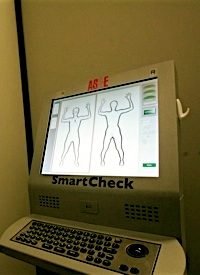
Perhaps responding to the increasing criticism for its unconstitutional policies, the Transportation Security Administration (TSA) announced major changes to its privacy policies. According to the agency, they will be utilizing newer technology in several U.S. airports. With the new equipment, when a passenger goes through a "naked body" scanner at a security checkpoint, a generic outline of a person is shown instead of a naked body.
The new technology is intended to address concerns posed by the advanced image technology (AIT) that has exposed naked pictures of travelers who enter the body scanners. Unsurprisingly, the scanners and the naked images that were produced by them provoked concerns regarding privacy rights.
Wired provides some background regarding the controversial scanners:
First tested in 2007, the AIT scanners became the object of intense media and public scrutiny around Thanksgiving. In addition to privacy concerns, some experts maintained the scanners’ safety was unproven, and that the technology was ineffective in detecting smuggled weapons and explosives. Travelers are permitted to opt-out of the scan, but are then subjected to an aggressive pat-down procedure.
While the new technology utilizes similar software to that found in the "naked body scanners," it provides the opportunity to uncover potentially dangerous items without exposing the passenger’s naked body. According to the TSA:
As with the current version of AIT, the areas identified as containing potential threats will require additional screening. The generic outline will be identical for all passengers. If no potential threat items are detected, an “OK” will appear on the monitor with no outline. By eliminating the passenger-specific image associated with the current version of AIT, a separate TSA officer will no longer be required to view the image in a remotely-located viewing room.
The change relies on software upgrades to the 241 millimeter wave body-scanning machines made by L-3 Communications.
John Pistole, TSA Administrator, indicates, “This software upgrade enables us to continue providing a high level of security through advanced imaging technology screening, while improving the passenger experience at checkpoints.”
The new equipment is being introduced at 40 airports nationwide, including in major transportation hubs such as Chicago, Dallas, Detroit, Miami, and Newark.
Reuters reports that the agency will be “testing similar software later this year for the 247 backscatter scanners that are in 38 airports and made by OSI Systems Inc’s Rapiscan Systems unit.”
The Blaze notes this of the announcement:
Interestingly, this change in body scanner technology has been announced at the same time that the TSA has been victorious in a U.S. appeals court case surrounding the use of its controversial scanners. The agency plans to eventually use this technology for more machines at more airports. Due to the lack of nudity inherent in these scanners, it is likely that people will be more comfortable and less opposed to their use.
The Electronic Privacy Information Center brought the case to the U.S. Court of Appeals, asking the court to block usage of the naked body scanners on the grounds that they are unconstitutional because of their invasiveness, and are ineffective and unsafe.
According to the appeals court, however, the machines are necessary in order to detect security concerns. Noting that there is a delicate balance between privacy and security, the court ruled that the balance “clearly favors the government here.” In a 3-0 decision, the court ruled in favor of the machines.
In an effort to make airport security more efficient, the TSA also announced it will be unveiling an expedited security program for those passengers who are frequent fliers. The new procedure will individualize security, differentiating itself from the current method of relying on uniform policies to secure airports.
Photo: A TSA agent monitors a body scanner: AP Images




